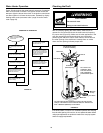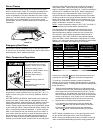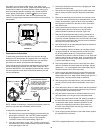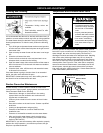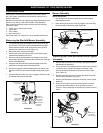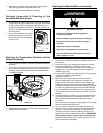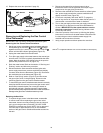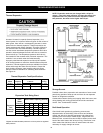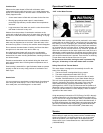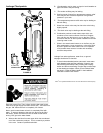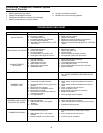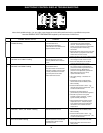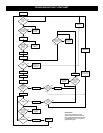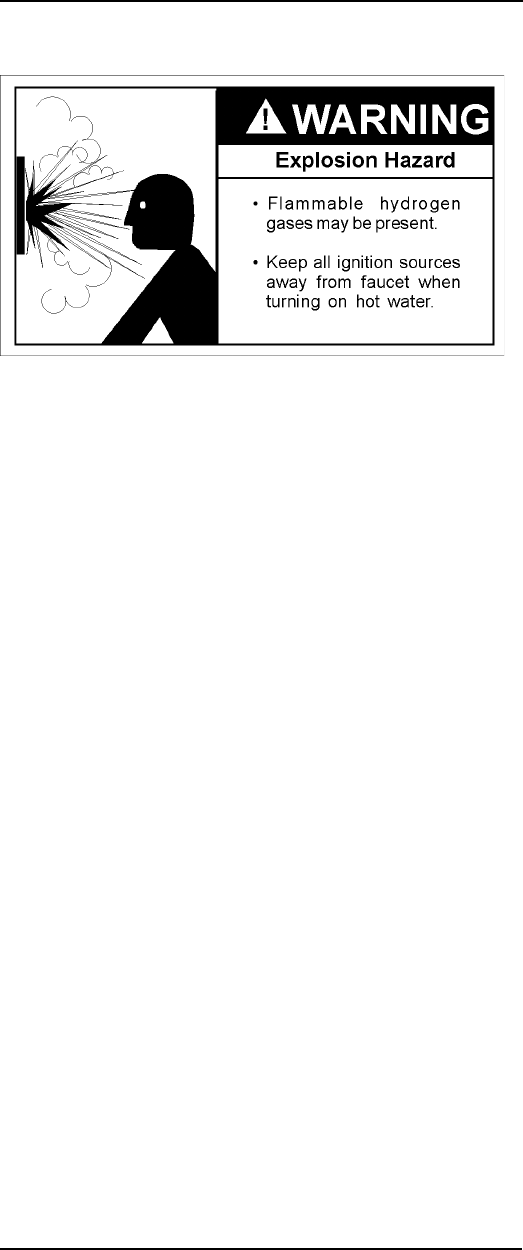
34
Condensation
Whenever the water heater is filled with cold water, some
condensate will form while the burner is on. A water heater may
appear to be leaking when in fact the water is condensation. This
usually happens when:
• A new water heater is filled with cold water for the first time.
• Burning gas produces water vapor In water heaters,
particularly high efficiency models where flue temperatures
are lower.
• Large amounts of hot water are used in a short time and the
refill water in the tank is very cold.
Moisture from the products of combustion condense on the
cooler tank surfaces and form drops of water which may fall onto
the burner or other hot surfaces to produce a “sizzling” or “frying”
noise.
Because of the suddenness and amount of water, condensation
water may be diagnosed as a “tank leak”. After the water in the
tank warms up (about 1-2 hours), the condition should disappear.
Do not assume the water heater is leaking until there has been
enough time for the water in the tank to warm up.
An undersized water heater will cause more condensation.
The water heater must be sized properly to meet the family’s
demands for hot water including dishwashers, washing machines
and shower heads.
Excessive condensation may be noticed during the winter and
early spring months when incoming water temperatures are at
their lowest.
Good venting is essential for a gas fired water heater to operate
properly as well as to carry away products of combustion and
water vapor.
Smoke Odor
It is not uncommon to experience a small amount of smoke and
odor during the initial start-up. This is due to burning off of oil
from metal parts, and will disappear in a short while.
Operational Conditions
“AIR” In Hot Water Faucets
HYDROGEN GAS: Hydrogen gas can be produced in a hot water
system that has not been used for a long period of time (generally
two weeks or more). Hydrogen gas is extremely fl ammable and
explosive. To prevent the possibility of injury under these conditions,
we recommend the hot water faucet, located farthest away, be
opened for several minutes before any electrical appliances
which are connected to the hot water system are used (such as a
dishwasher or washing machine). If hydrogen gas is present, there
will probably be an unusual sound similar to air escaping through the
pipe as the hot water faucet is opened. There must be no smoking
or open fl ame near the faucet at the time it is open.
Do not remove the anode, leaving the tank unprotected. By
doing so, all warranty on the water heater tank is voided.
Safety Shut-off and Thermal Switch
This water heater is designed to automatically shut-off in the
event of the following:
1. The burner flame is extinguished for any reason.
2. The water temperature exceeds 195°F (91°C).
3. Excessive build up of dust on the louvers of the air intake
chamber. See Maintenance of your Water Heater Section.
This unit is also equipped with a flammable vapor sensor (FV
Sensor), designed to shut off the gas supply in the event the
water heater has been exposed to flammable vapors (e.g.,
spilled gasoline). NOTE: If the FV-Sense senses the presence of
fl ammable vapors a special FV-Sense reset sequence is required
to be input into the Electronic Control Display in order to restore
operation of the water heater.
A high temperature limit switch or ECO (Energy Cut Off) in the tank
is used to shut off the unit if the water temperature exceeds 195°F
(91°C). The ECO is a single-use switch, which, if activated, requires
complete replacement of the entire gas control valve/thermostat. If
the ECO should activate, the water heater cannot be used until the
gas control valve/thermostat is replaced by a qualified technician.
Contact Sears Service 1-800-4-MY-HOME
®
(www.sears.com).
Service
Before calling for repair service, please read the Troubleshooting
Guide in this manual. If a condition persists or you are uncertain
about the operation of the water heater, let the Sears Service
Center check it out. Contact Sears Service 1-800-4-MY-HOME
®
(1-800-469-4663).



